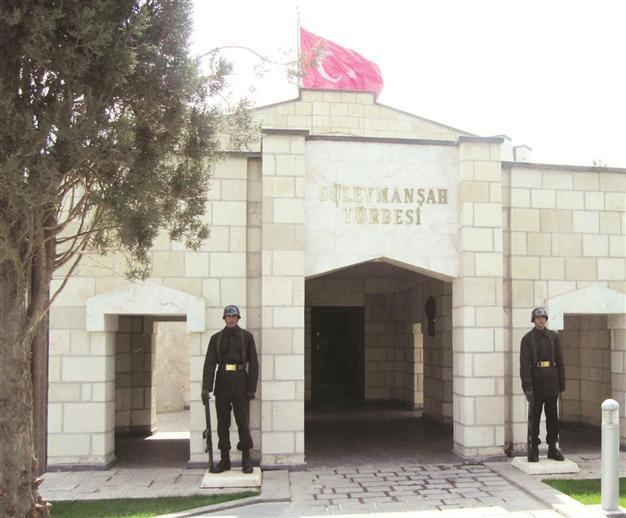Turkish soldiers still guard the tomb
ISTANBUL - The Associated Press

Turkish soldiers stand guard at the entrance of the memorial site of Suleyman Shah, grandfather of Osman I, in Karakozak village, northeast of Aleppo, Syria.
It’s a tiny plot of Turkey deep within violence-torn Syria” a sacred mausoleum guarded by Turkish troops.The memorial to Suleyman Shah, grandfather of Osman I, founder of the Ottoman Empire, has remained surrounded by a small contingent of Turkish soldiers even as Turkey helps to lead international condemnation of the Syrian regime, shutting its embassy in Damascus and demanding that President Bashar Assad resign.
Few travelers visited the tomb even before the Syrian government’s violent crackdown on an uprising that began more than a year ago. But the site along the Euphrates River is revered by Turkey, a strongly nationalist country whose rights there stem from a 1921 treaty with France, then colonial power in Syria.
The Ottoman empire collapsed in the early 20th century, and foreign powers encroached on its former territories. An article in the 1921 Franco-Turkish agreement lets Turkey keep guards and hoist its flag at the Syrian tomb, described as Turkish property. The arrangement was renewed with an independent Syria.
“Our soldiers are still there. There is no problem at all,” a Turkish military officer said on condition of anonymity because he was not authorized to speak to the media.
Still, sensitivities are extreme at a time when Turkey, and its Western and Arab allies, campaign for the downfall of the Syrian government and urge the Syrian opposition, including rebels, to unify. While Syria has not interfered with the Turkish soldiers, believed to number about a dozen, the instability sweeping the nation could pose problems to a tradition that seems to defy political realities.
Syria has made no public statements about the soldiers, possibly calculating that any move against them, particularly at a site heavy with Islamic symbolism, offers no political gain and only risks retaliation from its powerful neighbor. Turkey’s military headquarters declined to talk to The Associated Press, a likely sign that it does not want to publicize the memorial amid Syria’s chaos.
“This is a kind of a risk for Turkey,” said Osman Bahadir Dincer, a Syria expert at the International Strategic Research Organisation, a center in Ankara, the Turkish capital.
















